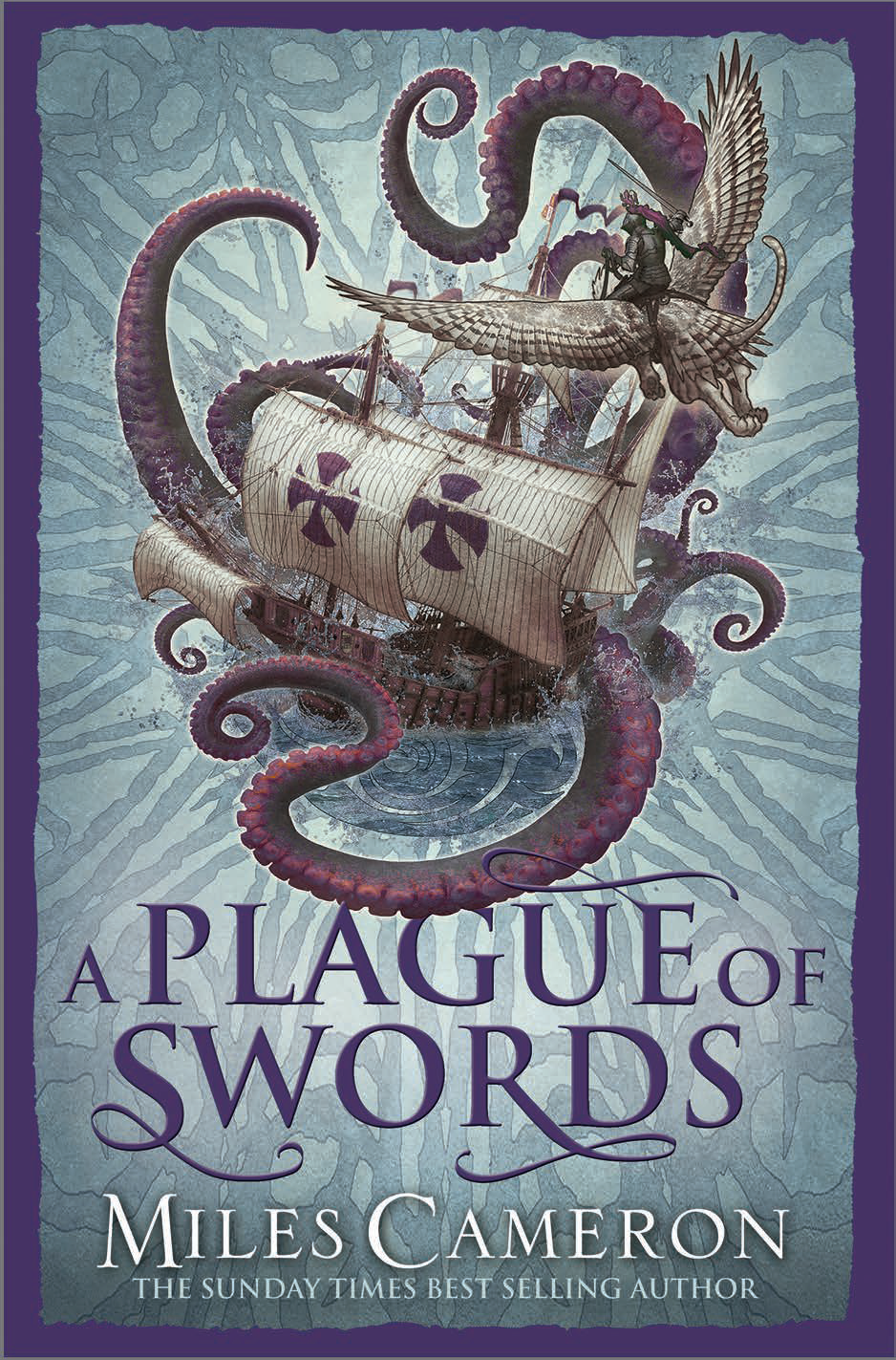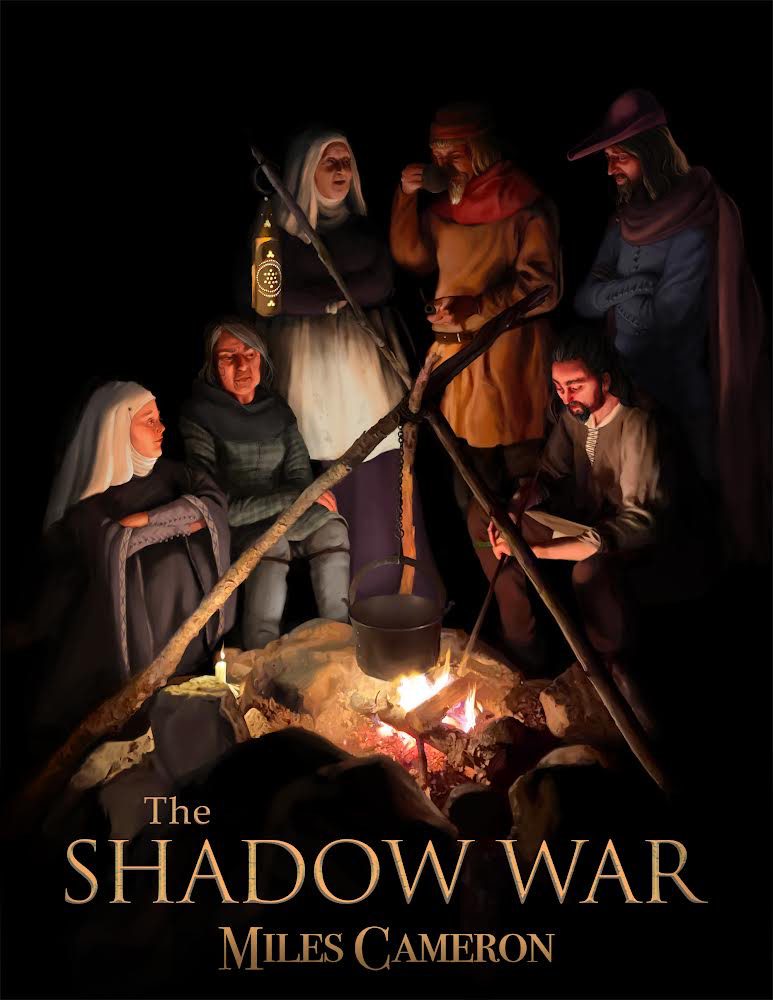
I have been asked many times what the difference is between writing about historical battles and fantasy battles. I suspect I’m going to disappoint you all; especially anyone who sees either genre as special and unique, and say that to me, they are often very similar. There are differences; for example, considering the effect of a dragon on a medieval battlefield is virtually the definition of ‘speculative fiction’ and trying to imagine the impact of reliable aviation (as in, a hippogrif, or allied wyverns) on logistics or reconnaissance in a medieval environment is almost as challenging.
But for me, the writer, both kinds of battle scenes are based on experience. The experience comes to me in different ways; lived experience, like conducting electronic warfare in an aging S-3 Viking;

reenactment experience, like commanding a thousand men (and women) in a recreation of a battle…

Or second hand experience, like reading a period account; perhaps Froissart‘s description of Otterburn or a detailed battlefield analysis by a modern historian, whether from Osprey or from an archaeological site survey. Sometimes experience mixes them; certainly the deepest study I’ve ever made of a single battle was my study of Plataea in 479 BCE; I walked the battlefield many times in person, but that’s not like having been int he battle; I’ve done a fair amount of reenacting in the 480 BCE period, but that’s till not the same as being there; I’ve read almost every word written on the subject, from Herodotus to modern PhD dissertations…

All the usual suspects make writing about battle especially challenging. Anyone who watches the History Channel or has seen a documentary on the Second World War or the war in Iraq or even recent fighting against ISIS has to be aware that every survivor of an intense combat experience has a different story of events; sometimes they even have different orders of occurrence, so that what seems to be someones magisterial, factual account of the Battle of Gettysburg may later appear to be heavily edited or rationalized. I have now read, for example, about forty first hand accounts of the first three days on the Somme; the extremely different levels of artillery preparation and the different German reactions meant that some British units were decimated while others moved briskly, even gloriously, forward to their objectives, giving different men starkly unique points of view about the same battle for the same piece of ground.
Alongside the difficulty of capturing ‘what really happened’ is, to me, the excitement and the problem of capturing ‘why it really happened.’ Battles; that is, the sort of decisive battles beloved of writers like me and wargamers and reenactors, are comparatively rare events. Despite what many writers would have you believe, a battle is not at all the ‘natural result’ of a military campaign. To give a few famous examples; after Poitiers, the French went to great lengths to avoid decisive field actions against the English; in the American Revolution, the nascent American army was very cautious in engaging the British field armies after White Plains and Brandywine; almost no one these days wants a stand-up decisive battle with tanks and air deployed against a US/NATO force. Roman and Byzantine armies marched endlessly around enemy terrain without being offered battle on any number of occasions. It is virtually a truism in military history that a major battle requires the commanders of both sides to believe that they have a decisive superiority in men, or material, or moral, and one of them is almost inevitably wrong.
And because one of them is wrong, there’s a story there; a story of character, of intellect, or anger or foolishness or vanity; really,a ll the things that go into good character writing. And, as any gamer knows, armies themselves have character, although not always the colourful and enjoyable character they appear to have when painted in 28mm. To understand why the french lost at Azincourt, for example, it is essential to understand a lot about French politics, about the mindset of the French chivalry, about…history.
And in a fantasy novel, most of the same rules apply or at least they ought to. Small, plucky warbands should not try to face giant armies of evil unless there are real, tactical reasons to do so; fleets stay in port when faced with unequal odds unless they have no other choice. Leonidas of Sparta led what is arguably the most famous dire last stand in history for complex political reasons (beautifully captured by Steven Pressfield, in his superb novel ‘Gates of Fire’ and if you have not read it, you should.). Leonidas did not merely stroll out one day, full of Spartan bravado, and elect to sacrifice himself and his state’s elite regiment for vanity.
Likewise, when Phormio led his outnumbered triremes to victory against Sparta, he did so from necessity, and after doing all the things a good storybook hero does; concentrating on morale, on training, and good pay, on tactical advantage. (Eventually, I hope someone will pay me to write a book about Phormio, one of my heroes.).
Even when more balanced forces clash, the events that lead up to the day of battle are often so utterly determinant of the outcome that they really are more important to the story than the actual moments of conflict; the poem ‘For the want of a nail’ pretty much summarizes my views on military history. The devil remains in details, whether of study, of experience, or of preparation for the fight.
One of the easiest things to write is battlefield magic in a fantasy setting. To quote my friend and fellow reenactor and gamer, Stephan Callahan, ‘Battlefield magic is just artillery that walks.’ This is almost exactly true. In the Red Knight series, I have tried to play with other kinds of battlefield magic; a spell that cuts bowstrings or snaps bows or rusts swords or heats armour…all of those sound effective, but really, given and reasonable matrix of magical ‘reality’ surely as soon as some smart lass comes up with a spell to superheat iron, someone else comes p with a rune to protect the iron; after all, that sort of ‘technological’ give and take seems to appear in every period of military history that we have enough data to study.
I did get a great deal of pleasure out of using my experience in EW (electronic warfare) and ASW (anti-submarine warfare) in writing Plague do Swords. My experience of carrier landings and my time as an amateur falconer were combined to give what I hope the reader perceives as ‘realistic’ views on flying a hippogriff off a medieval round ship. I tried to imagine how magic, the emanation of magical power and the propagation of such emanations might work int he physical world for detection of distant enemy casters at work, even for targeting. I believe that the scene in which Morgon Mortirmir helps boil water for laundry and thus draws the enemy sea monsters to a fight is one of the most frequently queried and asked about in all the RK books; what the reader was supposed to catch was that by casting, Mortirmir revealed his position… I spent time working out how, if a magical wave front moved in water the way sound does, the monsters would detect it, but that’s still roughly based on the real world. I used to spend a lot of time thinking about sonar… and radar…

One last comment. Years ago, I received a very nice piece of ‘fan mail’ from an Australian SAS veteran. He said a number of nice things and then went on to say something like ‘…but you must know perfectly well that most of the intimacy of actual combat is in the black and not really possible to remember.’ Right; I admit it; no real warrior or soldier could remember all the details of hand-to-hand combat that readers like to see. Further to that, there is an artificiality to the notion of military leadership, especially on the battlefield; I could name you examples of times where I suspect a general or leader claimed a brilliant tactic after the event, but at the time, depended utterly on luck and the toughness of his men to get him through the hour. There are a great many things that, even in a small action, no one can ever know.
But I’ll close with my last similarity between the battle genres; they are both fiction. I don’t mean they are ‘lies.’ I mean that, just as a great character novel like ‘Middlemarch’ or ‘Wuthering Heights’ uses a fictitious story to speak to some real things, so a good ‘battle’ novel can use fiction to explore what might have happened on a day in hell. Complete with character and motivation and plot.
And, sometimes, dragons.


Reblogged this on parmenionbooks.
I was hoping to get some details on how to write the battle. It seems too slow to write this then that, after this but before that.